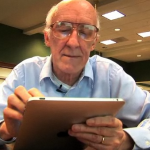 Earlier this week I attended the Open Innovation Summit at the Stevenage Bioscience Catalyst, where I participated on a panel on crowdsourcing. It was fascinating and inspiring to see how the pharma and biotech industries are beginning to embrace open innovation.
Earlier this week I attended the Open Innovation Summit at the Stevenage Bioscience Catalyst, where I participated on a panel on crowdsourcing. It was fascinating and inspiring to see how the pharma and biotech industries are beginning to embrace open innovation.
This blog has had a number of healthcare related posts over the past year, with a growing number of case studies of open innovation in the industry, whether it’s using crowds for better diagnosis or gamifying the research process. The latest in the canon of medical applications of open innovation is the open innovation challenge launched by the American Heart Association.
The challenge was launched to try and improve the readmission rates of patients who are hospitalised due to heart failure. Figures suggest that around 25% of such patients are readmitted to hospital within 30 days. The AHA open innovation challenge is seeking an early stage product that uses consumer technology to help either prevent or manage cardiovascular disease and stroke.
A $25,000 prize is available for the final three, with the AHA already reducing the field to a shortlist of 10 submissions, who are now turning to the medical crowdfunding site Medstartr to help them run a 30-day campaign via the site. The three winners will then be selected based on the amount of money raised, the number of social shares, and the input from a panel of expert judges.
Those teams will be invited to the association’s Health Sciences Innovation Investment Forum in NYC in March to present to investors and healthcare leaders. The winners will receive $25,000 in grants.
There are a number of interesting projects in the running. Health Recovery Solutions for instance have developed an iPad application to assist patients with their condition. It will allow clinicians to monitor what patients are doing after they are released from hospital and ensure they’re on track with their recovery.
In the seven hospitals that currently use the program, patients are given a tablet before being discharged that’s loaded with the program. It gives them instructions to perform and track key actions like taking their medications, weighing themselves and staying active. Their data is sent to the cloud, where predictive analytics and algorithms determine if a care team should be alerted about a patient whose condition is deteriorating.
Other interesting projects include two wearable sensors and a filter to remove toxins from donated blood before it’s transmitted to the patient. View all of the finalists, donate or vote here.
What a cool project. Thanks for sharing.
m-Health will serve a bigger human purpose by making modern healthcare to millions of people in the developing world.
The emergence of an iPhone-like platform for the digital health space will enable a vast, and highly valuable, ecosystem of "apps" that include hardware and software to become large businesses, similar to the experience in mobile.